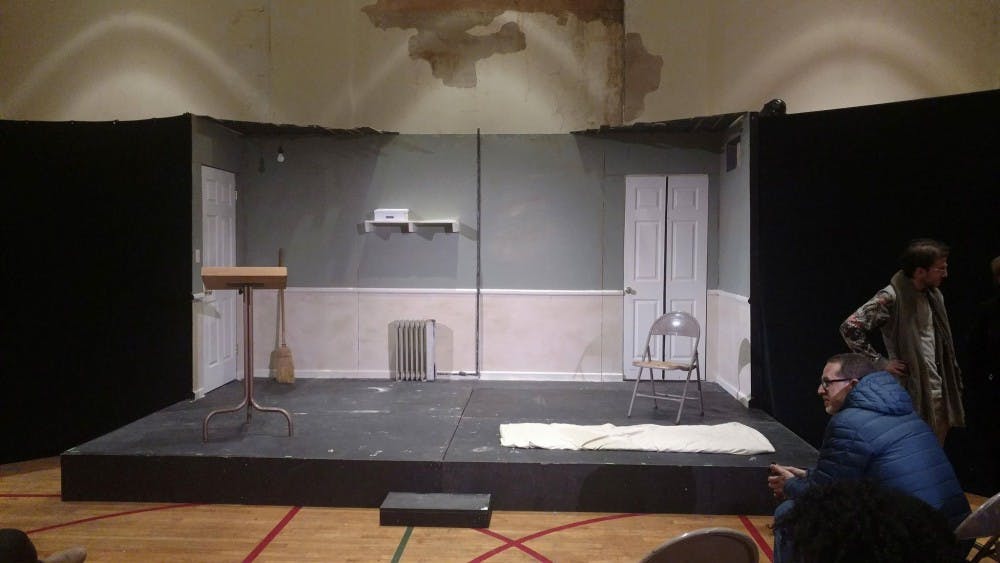Contrary to what its name would have you believe, Lee Blessing’s Two Rooms takes place within the confines of a single, small set piece.
The play, performed this past weekend at the Green Globe Theatre in Highlandtown, was largely set in a sparse room without any windows or furniture, just a mat on the floor and a shelf on the wall. Occasionally the actors used a folding chair or a podium, but for the most part, the room was empty.
At times the room represented the unknown locations where the kidnappers were storing Michael (Jared Swain), an American teacher working at a university in Beirut.
At others the setting switched to his office back in the United States where his wife, Lanie (Tatiana Nya Ford), strips the room of its furniture, save a mat on the floor, in an attempt to strengthen her connection to her husband.
While Michael spends most of the play alone, Lanie’s story is primarily told through her relationships with a few visitors. Ellen (Beverly Shannon), the government worker assigned to Michael’s case, stops by weekly to provide her with updates on Michael’s situation.
Meanwhile Walker (Sherod Lane), an ambitious reporter, encourages Lanie to take action and speak out, despite the potential repercussions. Over the course of his repeated visits to Michael’s office, Walker pushes Lanie to tell her story, even though she’d rather stay in the comfort of her husband’s room.
Despite the isolation that pervades Michael and Lanie’s stories, the Green Globe’s production of the show emphasized the invisible but palpable connection between them. As the perspective shifted from America to Beirut, Michael and Lanie entered and exited the stage, staring longingly at one another.
During their imagined conversations with one another, they sat against the wall and held each other. Despite the distance, the two characters always felt incredibly close to one another. Furthermore, according to lead actress Tatiana Nya Ford, the interactions between Lanie, Walker and Ellen developed Lanie’s character beyond her initial categorization as a victim.
“Having too many scenes with [Lanie] and Michael would have made her victimized sorrow more prominent,” Ford wrote in an email to The News-Letter. “Having [Walker] and Ellen showed her frustrations and all that was tugging at her at the moment.”
Indeed, the scenes with Walker and Ellen, each representing a different emotional path for Lanie to follow, added some much needed depth to both her character and the play as a whole. Through their repeated, and often ineffectual, attempts to comfort Lanie and to steer her onto their respective paths, Walker and Ellen force Lanie’s anger, frustration and sorrow out into the spotlight, making her more than just a stereotype.
Eventually Lanie attempts to take the situation into her own hands, but Blessing does not provide a resolution as simple as viewers might have desired. Lanie and Michael are in a situation where hope might not be enough to reunite them, and the plot does not cheapen their situation by providing an easy, fairy-tale ending.
Two Rooms did stutter, however, when it attempted to find some greater meaning in the situation. At times it seemed to be trying to say something about the situation in the Middle East, or the impacts of war upon the defenseless or the power of sacrifice.
However, despite powerful performances by the cast, those scenes tended to fall flat. It was difficult to determine what commentary they were meant to offer.
It’s in the little moments that the play thrives. Lanie and Michael sitting together while each imagines the other’s face is especially powerful, as are the scenes where Ellen and Walker hint that they care about Lanie far beyond the situation that has brought them all together.
My personal favorite came when, in one of her imagined interactions with Michael, Lanie removes his blindfold and reveals his face to the audience. The tender care with which Nya Ford and Swain portray the interaction was truly poignant, and Michael and Lanie’s love for one another was palpable.
Ultimately the play’s most effective and consistent message is that maybe there isn’t a greater meaning behind these events.
“[The play is] just a glimpse into the lives of some of the bruised,” Ford wrote.
Maybe there is no greater takeaway than the image of Michael and Lanie, sitting against the wall, alone in the room together.





